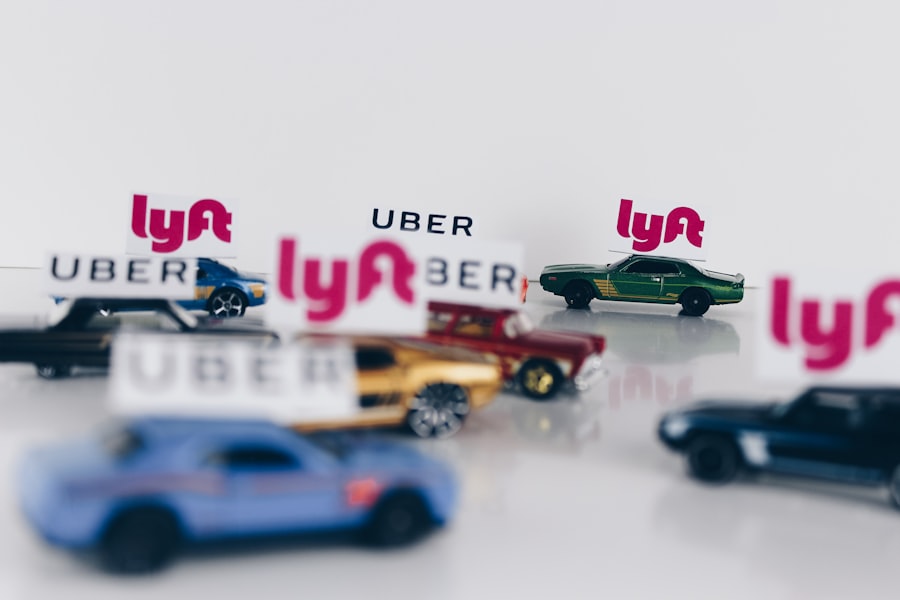“This post may contain affiliate links, if you click a link we may earn a commission if you purchase from that merchant.”
Rideshare insurance is a type of insurance coverage specifically designed for drivers who work for rideshare companies such as Uber and Lyft. It provides protection for both the driver and their passengers in the event of an accident or other incident while driving for the rideshare company.
As a rideshare driver, it is crucial to have proper insurance coverage. While Uber and Lyft do provide some insurance coverage for their drivers, it may not be enough to fully protect you in all situations. Without the right insurance, you could be left financially responsible for any damages or injuries that occur while you are driving for the rideshare company.
Table of Contents
Understanding the Risks of Driving for Uber and Lyft
Driving for Uber and Lyft comes with its fair share of risks. One of the main risks is the increased likelihood of being involved in an accident due to the amount of time spent on the road. Rideshare drivers often spend long hours driving, which increases their exposure to potential accidents.
There have been numerous incidents involving rideshare drivers, ranging from minor fender benders to more serious accidents resulting in injuries or even fatalities. In some cases, drivers have been targeted by criminals posing as passengers, putting their safety at risk.
The Differences Between Personal and Commercial Car Insurance
Personal car insurance is what most people have for their personal vehicles. It provides coverage for accidents and other incidents that occur while using the vehicle for personal use. Commercial car insurance, on the other hand, is designed for vehicles used for business purposes.
When it comes to rideshare driving, personal car insurance may not be enough to fully protect you. Most personal car insurance policies have exclusions for using your vehicle for commercial purposes, which means that if you are involved in an accident while driving for Uber or Lyft, your personal car insurance may not cover you.
Uber and Lyft Insurance Policies: What They Cover and When
Uber and Lyft both provide insurance coverage for their drivers, but the coverage is not always in effect. The coverage provided by Uber and Lyft is divided into different periods, depending on whether the driver is offline, waiting for a ride request, or actively transporting a passenger.
During Period 1, when the driver is online but waiting for a ride request, both Uber and Lyft provide limited liability coverage. However, this coverage may not be enough to fully protect the driver in the event of an accident.
During Period 2, when the driver has accepted a ride request and is en route to pick up the passenger, both Uber and Lyft provide additional liability coverage as well as comprehensive and collision coverage for the driver’s vehicle.
During Period 3, when the driver has picked up the passenger and is actively transporting them, both Uber and Lyft provide the highest level of liability coverage as well as comprehensive and collision coverage for the driver’s vehicle.
The Coverage Gap: When You’re Waiting for a Ride Request
One of the biggest gaps in insurance coverage for rideshare drivers occurs during Period 1, when the driver is online but waiting for a ride request. During this time, both Uber and Lyft provide limited liability coverage, but it may not be enough to fully protect the driver in the event of an accident.
This coverage gap can leave drivers vulnerable to financial loss if they are involved in an accident during this period. Without proper insurance coverage, drivers could be left responsible for any damages or injuries that occur while they are waiting for a ride request.
Optional Rideshare Insurance: Pros and Cons
To fill the coverage gap during Period 1, many insurance companies now offer optional rideshare insurance policies. These policies are specifically designed to provide coverage for rideshare drivers during all periods of driving, including when they are waiting for a ride request.
There are pros and cons to purchasing optional rideshare insurance. The main advantage is that it provides additional coverage and peace of mind for rideshare drivers. With this coverage, drivers can be confident that they are protected in the event of an accident or other incident while driving for Uber or Lyft.
However, one of the main drawbacks of optional rideshare insurance is the additional cost. Rideshare insurance policies can be more expensive than traditional personal car insurance policies, which can be a deterrent for some drivers. It is important to weigh the cost against the potential benefits and decide if the additional coverage is worth it for your specific situation.
How to Choose the Right Rideshare Insurance Policy
When choosing a rideshare insurance policy, there are several factors to consider. First and foremost, you should ensure that the policy provides coverage during all periods of driving, including when you are waiting for a ride request.
You should also consider the cost of the policy and how it fits into your budget. While it may be tempting to choose the cheapest option, it is important to remember that you get what you pay for. Make sure to compare different policies and their coverage limits to find the best option for your needs.
Additionally, you should consider the reputation and financial stability of the insurance company. Look for a company with a strong track record of customer service and claims handling. You want to be confident that they will be there for you in the event of an accident or other incident.
Filing a Claim: What to Expect and How to Do It
If you are involved in an accident or other incident while driving for Uber or Lyft, it is important to know how to file a claim with your rideshare insurance company. The process may vary depending on the specific insurance company, but there are some general steps you can follow.
First, you should gather all relevant information about the incident, including any police reports or witness statements. Take photos of any damages or injuries, if possible. This information will be important when filing your claim.
Next, contact your insurance company as soon as possible to report the incident. They will guide you through the claims process and provide you with any necessary forms or documentation.
It is important to be honest and accurate when providing information to your insurance company. Any false or misleading information could result in your claim being denied.
The Future of Rideshare Insurance: Changes on the Horizon
The world of rideshare insurance is constantly evolving, and there are potential changes on the horizon that could affect drivers. One potential change is the introduction of mandatory rideshare insurance requirements in certain states or cities.
Some states have already implemented mandatory rideshare insurance requirements, while others are considering it. These requirements would ensure that all rideshare drivers have proper insurance coverage, protecting both the driver and their passengers.
Another potential change is the expansion of coverage provided by Uber and Lyft themselves. As the industry continues to grow and evolve, it is possible that Uber and Lyft may increase the coverage limits and expand coverage to fill some of the existing gaps.
Protecting Yourself and Your Passengers as a Rideshare Driver
In conclusion, having proper insurance coverage is essential for rideshare drivers. While Uber and Lyft do provide some insurance coverage, it may not be enough to fully protect you in all situations. Optional rideshare insurance policies can provide additional coverage during all periods of driving, including when you are waiting for a ride request.
When choosing a rideshare insurance policy, it is important to consider factors such as coverage limits, cost, and the reputation of the insurance company. Filing a claim with your rideshare insurance company requires gathering relevant information and contacting them as soon as possible.
The future of rideshare insurance may bring changes such as mandatory insurance requirements and expanded coverage from Uber and Lyft themselves. As a rideshare driver, it is important to stay informed about these potential changes and ensure that you have the proper insurance coverage to protect yourself and your passengers.
If you’re interested in learning more about insurance options beyond rideshare coverage, check out this informative article on essential home insurance plans. Understanding the different types of coverage available for your home can help protect your investment and provide peace of mind. Whether you’re a homeowner or a renter, it’s important to have the right insurance in place. To learn more, visit https://settleinsurance.com/home-insurance/3-essential-home-insurance-plans/.



































